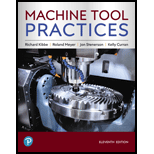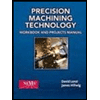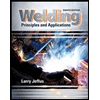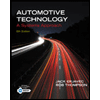
Machine Tool Practices (11th Edition)
11th Edition
ISBN: 9780134893501
Author: Richard R. Kibbe, Roland O. Meyer, Jon Stenerson, Kelly Curran
Publisher: PEARSON
expand_more
expand_more
format_list_bulleted
Textbook Question
Chapter B.6, Problem 8ST
Why are rake angles varied on taps for different materials?
Expert Solution & Answer
Want to see the full answer?
Check out a sample textbook solution
Students have asked these similar questions
Please do not use any AI tools to solve this question.
I need a fully manual, step-by-step solution with clear explanations, as if it were done by a human tutor.
No AI-generated responses, please.
Please do not use any AI tools to solve this question.
I need a fully manual, step-by-step solution with clear explanations, as if it were done by a human tutor.
No AI-generated responses, please.
Please do not use any AI tools to solve this question.
I need a fully manual, step-by-step solution with clear explanations, as if it were done by a human tutor.
No AI-generated responses, please.
Chapter B Solutions
Machine Tool Practices (11th Edition)
Ch. B.1 - List several uses of the arbor press.Ch. B.1 - A newly machined steel shaft with an interference...Ch. B.1 - The ram of an arbor press is loose in its guide...Ch. B.1 - When a bushing is pushed into a bore that is...Ch. B.1 - Prob. 5STCh. B.1 - What difference is there in the way a press fit is...Ch. B.1 - Prior to installing a bushing with the arbor...Ch. B.1 - Name five ways to avoid tool breakage and other...Ch. B.2 - Name two types of bench visesCh. B.2 - Prob. 2ST
Ch. B.2 - How can the finished surface of a part be...Ch. B.2 - Name three things that should never be done to a...Ch. B.2 - How should a vise be Lubricated?Ch. B.2 - Prob. 6STCh. B.2 - What advantage does the lever-jawed wrench offer...Ch. B.2 - Some objects should never be struck with a hard...Ch. B.2 - Why should pipe wrenches never be used on bolts,...Ch. B.2 - What are the two important things to remember...Ch. B.3 - What is the kerf?Ch. B.3 - What is the set on a saw blade?Ch. B.3 - What is the pitch of the hacksaw blade?Ch. B.3 - What determines the selection of a saw blade for a...Ch. B.3 - Hand hacksaw blades fall into two basic...Ch. B.3 - Give four causes that make saw blades dull.Ch. B.3 - Give two reasons why hacksaw blades break.Ch. B.3 - A new hacksaw blade should not be used in a cut...Ch. B.4 - What are the four different cuts found on files?Ch. B.4 - Name four coarseness designations for files.Ch. B.4 - Which of the two kinds of files-single cut or...Ch. B.4 - What are the coarseness designations for needle...Ch. B.4 - Prob. 5STCh. B.4 - What causes a file to get dull?Ch. B.4 - Why should a handle be used on a file?Ch. B.4 - How does the hardness of a workpiece affect the...Ch. B.4 - Should pressure be applied to a file on the return...Ch. B.4 - Why is a round file rotated while it is being...Ch. B.5 - Prob. 1STCh. B.5 - What is the purpose of a starting taper on a...Ch. B.5 - What is the advantage of a spiral flute reamer...Ch. B.5 - How does the shank diameter of a hand reamer...Ch. B.5 - Prob. 5STCh. B.5 - Prob. 6STCh. B.5 - What is the purpose of cutting fluid in reaming?Ch. B.5 - Prob. 8STCh. B.5 - How much reaming allowance is left for hand...Ch. B.5 - If you were repairing the lathe tailstock taper,...Ch. B.6 - What type of tap is used to produce threads that...Ch. B.6 - Prob. 2STCh. B.6 - Prob. 3STCh. B.6 - When is a spiral fluted tap used?Ch. B.6 - How are thread-forming taps different from...Ch. B.6 - How are taper pipe taps identified?Ch. B.6 - Why are finishing and roughing Acme taps used?Ch. B.6 - Why are rake angles varied on taps for different...Ch. B.7 - What kind of tools are used to drive taps when...Ch. B.7 - What is a hand tapper?Ch. B.7 - What is a tapping attachment?Ch. B.7 - Which three factors affect the strength of a...Ch. B.7 - How deep should the usable threads be in a tapped...Ch. B.7 - What causes taps to break while tapping?Ch. B.7 - What causes rough and tom threads?Ch. B.7 - Give three methods of removing broken taps from...Ch. B.8 - What is a die?Ch. B.8 - What tool is used to drive a die?Ch. B.8 - How much adjustment is possible with a round split...Ch. B.8 - What are important points to watch when assembling...Ch. B.8 - Why do dies have a chamfer on the cutting end?Ch. B.8 - Why are cutting fluids used?Ch. B.8 - What diameter should a rod be before being...Ch. B.8 - Why should a rod be chamfered before being...Ch. B.9 - Prob. 1STCh. B.9 - Why should a tool grinder never be used for rough...Ch. B.9 - Prob. 3STCh. B.9 - Prob. 4STCh. B.9 - Prob. 5STCh. B.9 - Prob. 6STCh. B.9 - Prob. 7STCh. B.9 - What is the purpose of the wheel blotter?Ch. B.9 - Prob. 9STCh. B.9 - What does the wheel ring test do?
Knowledge Booster
Learn more about
Need a deep-dive on the concept behind this application? Look no further. Learn more about this topic, mechanical-engineering and related others by exploring similar questions and additional content below.Similar questions
- [Q2]: The cost information supplied by the cost accountant is as follows:Sales 20,00 units, $ 10 per unitCalculate the (a/ newsale guantity and (b) new selling price to earn the sameVariable cost $ 6 per unit, Fixed Cost $ 30,000, Profit $ 50,000profit ifi) Variable cost increases by $ 2 per unitil) Fixed cost increase by $ 10,000Ili) Variable cost increase by $ 1 per unit and fixed cost reduces by $ 10,000arrow_forwardcan you please help me perform Visual Inspection and Fractography of the attatched image: Preliminary examination to identify the fracture origin, suspected fatigue striation, and corrosion evidences.arrow_forwardcan you please help[ me conduct Causal Analysis (FTA) on the scenario attatched: FTA diagram which is a fault tree analysis diagram will be used to gain an overview of the entire path of failure from root cause to the top event (i.e., the swing’s detachment) and to identify interactions between misuse, material decay and inspection errors.arrow_forward
- hi can you please help me in finding the stress intensity factor using a k-calcluator for the scenario attathced in the images.arrow_forwardHi, can you please help me .Identify and justify suitable analytical techniques of the scenario below, bearing in mind the kinds of information being handled to reach a conclusion (methodology). A child swing set was discovered to have failed at the fixing at the top of the chains connecting the seat to the top of the swing set. A 12 mm threaded steel bolt, connecting the shackle to the top beam, failed at the start of the threaded region on the linkage closest to the outside side of the swing set . The linkage and bolts were made of electro galvanised mild steel . The rigid bar chain alternatives and fixings were of the same material and appeared to be fitted in accordance with guidelines. The yield strength of the steel used is 260 MPa and the UTS is 380 MPa. The bolt that failed was threaded using a standard thread with a pitch (distance between threads) of 1.75 mm and a depth of approximately 1.1 mm. The swing set in question had been assigned to ‘toddlers’ with the application of…arrow_forwardHi, can you please define and calculate the failure mode of the linkage that failed on the swing (images added) : A child swing set was discovered to have failed at the fixing at the top of the chains connecting the seat to the top of the swing set. A 12 mm threaded steel bolt, connecting the shackle to the top beam, failed at the start of the threaded region on the linkage closest to the outside side of the swing set . The linkage and bolts were made of electro galvanised mild steel . The rigid bar chain alternatives and fixings were of the same material and appeared to be fitted in accordance with guidelines. The yield strength of the steel used is 260 MPa and the UTS is 380 MPa. The bolt that failed was threaded using a standard thread with a pitch (distance between threads) of 1.75 mm and a depth of approximately 1.1 mm. The swing set in question had been assigned to ‘toddlers’ with the application of a caged-type seat. However, the location was within the play area not…arrow_forward
- Page 11-68. The rectangular plate shown is subjected to a uniaxial stress of 2000 psi. Compute the shear stress and the tensile developed on a plane forming an angle of 30° with the longitud axis of the member. (Hint: Assume a cross-sectional area of unity) 2000 psi 2000 psi hparrow_forward11-70. A shear stress (pure shear) of 5000 psi exists on an element. (a) Determine the maximum tensile and compressive stresses caused in the element due to this shear. (b) Sketch the element showing the planes on which the maximum tensile and compressive stresses act.arrow_forward11-20. An aluminum specimen of circular cross section, 0.50 in. in diameter, ruptured under a tensile load of 12,000 lb. The plane of failure was found to be at 48° with a plane perpendicular to the longitudinal axis of the specimen. (a) Compute the shear stress on the failure plane. (b) Compute the maximum tensile stress. (c) Compute the tensile stress on the failure plane. hparrow_forward
- A long flat steel bar 13 mm thick and 120 mm wide has semicircular grooves as shown and carries a tensile load of 50 kN Determine the maximum stress if plate r= 8mm r=21mm r=38mmarrow_forwardProblem 13: F₁ = A =250 N 30% Determine the moment of each of the three forces about point B. F₂ = 300 N 60° 2 m -3 m B 4 m F3=500 Narrow_forward3 kN 3 kN 1.8 kN/m 80 mm B 300 mm D an 1.5 m-1.5 m--1.5 m- PROBLEM 5.47 Using the method of Sec. 5.2, solve Prob. 5.16 PROBLEM 5.16 For the beam and loading shown, determine the maximum normal stress due to bending on a transverse section at C.arrow_forward
arrow_back_ios
SEE MORE QUESTIONS
arrow_forward_ios
Recommended textbooks for you
 Precision Machining Technology (MindTap Course Li...Mechanical EngineeringISBN:9781285444543Author:Peter J. Hoffman, Eric S. Hopewell, Brian JanesPublisher:Cengage Learning
Precision Machining Technology (MindTap Course Li...Mechanical EngineeringISBN:9781285444543Author:Peter J. Hoffman, Eric S. Hopewell, Brian JanesPublisher:Cengage Learning Welding: Principles and Applications (MindTap Cou...Mechanical EngineeringISBN:9781305494695Author:Larry JeffusPublisher:Cengage Learning
Welding: Principles and Applications (MindTap Cou...Mechanical EngineeringISBN:9781305494695Author:Larry JeffusPublisher:Cengage Learning Automotive Technology: A Systems Approach (MindTa...Mechanical EngineeringISBN:9781133612315Author:Jack Erjavec, Rob ThompsonPublisher:Cengage Learning
Automotive Technology: A Systems Approach (MindTa...Mechanical EngineeringISBN:9781133612315Author:Jack Erjavec, Rob ThompsonPublisher:Cengage Learning

Precision Machining Technology (MindTap Course Li...
Mechanical Engineering
ISBN:9781285444543
Author:Peter J. Hoffman, Eric S. Hopewell, Brian Janes
Publisher:Cengage Learning

Welding: Principles and Applications (MindTap Cou...
Mechanical Engineering
ISBN:9781305494695
Author:Larry Jeffus
Publisher:Cengage Learning

Automotive Technology: A Systems Approach (MindTa...
Mechanical Engineering
ISBN:9781133612315
Author:Jack Erjavec, Rob Thompson
Publisher:Cengage Learning
HOME SHOP JIGS & FIXTURES PART 1, TYPES OF JIGS & ACCESSORIES AND THE THEORIE BEHIND THE TOOLS; Author: THATLAZYMACHINIST;https://www.youtube.com/watch?v=EXYqi42JimI;License: Standard Youtube License